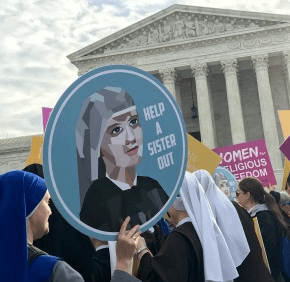In all the cases to be argued before the high court in March, appellate courts in various jurisdictions sided with the Obama administration. The rulings said the religious entities’ freedom of religion was not burdened by having to comply with the mandate as they have argued, because the federal government has in place an accommodation for a third party to provide the contested coverage.
But the religious groups object to that notification, saying they still would be complicit in supporting practices they oppose. While their appeals worked their way to the high court, the government has not been able to force the groups to comply with the mandate or face daily fines for noncompliance.
Then HHS or the Department of Labor government in turn tells insurers and third-party administrators that they must cover the services at no charge to employees.
Also see:
Independence Day Mass closes U.S. bishops’ annual Fortnight for Freedom
Archbishop Lori begins Fortnight for Freedom with Gospel connection


